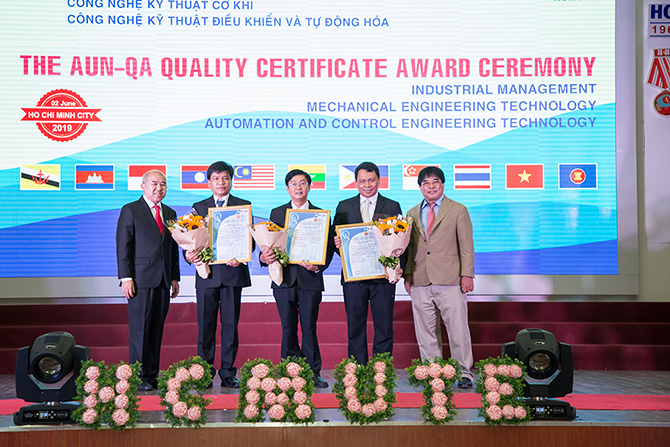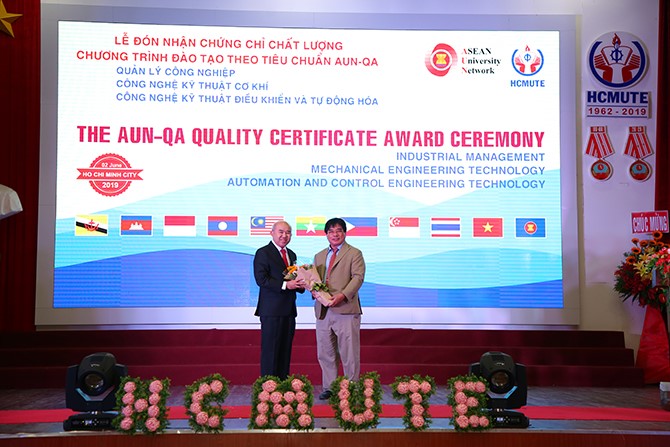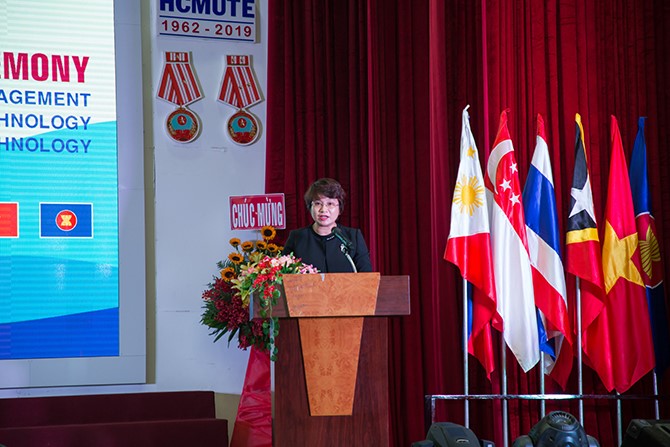Sunday morning 2 June 2019 witnessed another landmark in the development of Ho Chi Minh City University of Technology and Education (HCMUTE) when it received quality certificates for three more training programs accredited by ASEAN University Network Quality Assurance system (AUN-QA).
The certificate award ceremony was proudly organized at HCMUTE Grand Hall, just before the Commencement Ceremony for fresh graduates of 2014 and 2015 cohort.
The three newest AUN-QA accredited programs are Industrial Management (Faculty of Economics), Mechanical Engineering Technology (Faculty of Mechanical Engineering), and Automation and Control Engineering Technology (Faculty of Electrical and Electronics Engineering).
On the 7-point scale of AUN-QA system, Mechanical Engineering Technology received 5 marks (better than expected), while Industry Management and Automation and Control Engineering Technology both got 4 (satisfied).
This is the fourth time HCMUTE has celebrated AUN-QA certificate award ceremony since 2016, with a total of eleven training programs accredited. The assessment process took place successfully during December 2018.

Deans of three faculties involved receive AUN - QA certificates.
At the event, HCMUTE had the honourable attendance of Prof. Dr. Shahrir Abdullah, Acting Vice President of AUN-QA Council, and Assoc. Prof. Dr. Nguyen Thu Thuy, Deputy Director of Ministry of Education and Training (MOET)’s Higher Education Department.
The university council and management, as well as its partners’ representatives and press agencies also attended the ceremony.
In his opening remark, Assoc. Prof. Dr. Do Van Dung, President of HCMUTE, acknowledged all great efforts made by the staff, lecturers, students, and alumni of the three faculties involved, and other individuals who have been working dedicatedly to build and maintain the university’s quality.
“HCMUTE’s external AUN-QA assessment at institutional level is projected to start at the end of next year,” Dr. Dung revealed.
Assoc. Prof. Dr. Do Van Dung, HCMUTE President, delivers a speech at the ceremony.
According to Dr. Dung, HCMUTE has always strived to constantly improve the quality of all areas in order to provide students with the most premium curricula as it can.
The university educational philosophy, Humanity – Innovation – Integration, is included in the medium-term strategic plan and the annual quality objectives so that it can be implemented.
In order to achieve the objectives, the curricula are periodically reviewed and adjusted to keep up with the change of the higher education and meet the new demands of university’s stakeholders, especially the enterprises.
Simultaneously, HCMUTE has heavily invested in building and upgrading labs, classrooms, playgrounds and self-training areas for students.
Besides, the university has also received generous support from alumni and businesses in forms of scholarships,equipment, and internship and job opportunities, not to mention soft skills training workshops for students.
“Thanks to this, more than 60% of HCMUTE students have a job before graduation, as statistics show,” said the President.
Addressing at the ceremony, Prof. Dr. Shahrir Abdullah, Acting Vice President of AUN-QA Council, acknowledged the constant efforts HCMUTE has been making in improving its quality to participate in external AUN-QA assessment.

Prof. Dr. Shahrir Abdullah, Acting Vice President of AUN-QA Council, congratulates HCMUTE on its great achievements.
As Prof. Dr. Shahrir Abdullah stated, over the past decades, higher education in ASEAN countries has seen unprecedented diverse growth and had strong influence on learners, even on the government and society.
“Higher education is the main driving force for economy and society; improving the quality of educational institutions is therefore of utmost urgency,” added Prof. Dr. Abdullah.
Founded in 1998, AUN-QA system so far has become the standards for education systems and mechanisms in ASEAN countries.
Its assessment process focuses on the educational institution’s constant quality improvement in order to ensure the quality of higher education in the region.
On this occasion, Prof. Dr. Shahrir Abdullah also sent his sincerest thanks to the member universities, especially HCMUTE, for always being active and supportive with tremendous efforts over the years.
Following Prof. Dr. Shahrir Abdullah, Assoc. Prof. Dr. Nguyen Thu Thuy, Deputy Director of MOET’s Higher Education Department, also extended her congratulations to HCMUTE on having three more AUN-QA accredited programs.
She highly appreciated HCMUTE’s strategic plan for AUN-QA and ABET accreditation in future years.
“Eleven training programs are accredited according to AUN-QA standards in just three years, that is an impressive achievement,” expressed Assoc. Prof. Dr. Thuy.
Dr. Thuy also believes HCMUTE is always one of the leading universities in Vietnam, and a typical role model in the field of education quality assurance, contributing to achieving the strategic objectives of the higher education system in Vietnam.

Assoc. Prof. Dr. Nguyen Thu Thuy, Deputy Director of MOET’s Higher Education Department, extends her warm congratulations to HCMUTE.
Over the past years, MOET has issued a great number of guidelines and carried out official policies for educational institutions to perform its autonomy, and encouraged them to take part in national, regional, and international education quality assessment.
“One of our trusted partners for this mission is AUN-QA. So far, Vietnam has had a total of three official members and 33 associate members of AUN-QA system,” said Dr. Thuy.
“Vietnam is also one of the two countries having the highest number of successfully accredited programs in ASEAN, with 130 programs up to now,” Dr. Thuy added.
Currently, Vietnam is conducting policies to basically and comprehensively innovate the quality of education and training, matching the requirements of the industrialization and modernization process in the context of socialist-oriented market economy and international integration.
For that reason, MOET has determined that education quality is of greatest importance; therefore, quality assurance as well as quality accreditation activities should be focused and promoted throughout the education system, in compliance with the ASEAN Quality Assurance Framework (AQAF), and applying regional and international quality standards.
“To do so, the entire education system and educational institutions have to proactively take actions for improvement and innovation, so as to provide high quality human resources suitable for regional and international labour markets,” Dr. Thuy concluded.

Divisions and individuals receive certificates of commendation for their valuable contribution to the assessment of the three programs.